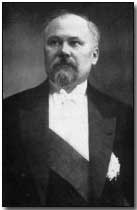Primary Documents - The Abandonment of Paris by the French Government, 3 September 1914
 Reproduced below is the
text of the proclamation issued by the French government and military
authorities announcing the relocation of the French government to Bordeaux.
Reproduced below is the
text of the proclamation issued by the French government and military
authorities announcing the relocation of the French government to Bordeaux.
The proclamation informed the citizens of Paris that the French government had left the city - to Bordeaux - in order to ensure that the entire country could continue to be governed while Paris was placed under siege by the invading German forces. The relocation was, the proclamation emphasised, "temporary", and full confidence in the ability of the French Army to meet the German threat and thus save the city was expressed.
The government's decision to leave the French capital was based upon advice from the French Army Commander-in-Chief, Joseph Joffre, in which he stated that he could not guarantee the safety of the capital and consequently recommended that the government relocate to Bordeaux.
Joffre - working with the Military Commander of Paris, General Joseph Gallieni - helped ensure the survival of the city, at one point by rushing French troops to the defensive lines via a stream of Parisian taxi cabs. Paris was finally saved following the successful First Battle of the Marne in early September 1914.
Click here to read Gallieni's proclamation issued the same day as the government proclamation.
The Abandonment of Paris and the Withdrawal of the French Government to Bordeaux - The Government Proclamation
September 3rd
PEOPLE OF FRANCE!
For several weeks relentless battles have engaged our heroic troops and the army of the enemy. The valour of our soldiers has won for them, at several points, marked advantages; but in the north the pressure of the German forces has compelled us to fall back.
This situation has compelled the President of the Republic and the Government to take a painful decision.
In order to watch over the national welfare, it is the duty of the public powers to remove themselves, temporarily from the city of Paris.
Under the command of an eminent Chief, a French Army, full of courage and zeal, will defend the capital and its patriotic population against the invader.
But the war must be carried on at the same time on the rest of its territory.
Without peace or truce, without cessation or faltering, the struggle for the honour of the nation and the reparation of violated rights must continue.
None of our armies is impaired. If some of them have sustained very considerable losses, the gaps have immediately been filled tip from the reserves, and the appeal for recruits assures us of new reserves in men and energy tomorrow.
Endure and fight! Such must be the motto of the Allied British, Russian, Belgian, and French armies.
Endure and fight, while at sea the British aid us, cutting the communication of our enemy with the world.
Endure and fight, while the Russians continue to advance to strike the decisive blow at the heart of the German Empire.
It is the duty of the Government of the Republic to direct this stubborn resistance.
Everywhere Frenchmen will rise for their independence; but, to insure the utmost spirit and efficacy in the formidable fight, it is indispensable that the Government shall remain free to act.
At the request of the military authorities, the Government is therefore temporarily transferring its headquarters to a place where it can remain in constant touch with the whole of the country.
It requests members of Parliament not to remain away from it, in order that they may form, with their colleagues, a bond of national unity.
The Government leaves Paris only after having assured the defence of the city and of the entrenched camp by every means in its power.
It knows that it does not need to recommend to the admirable population of Paris that calm, resolution, and coolness which it is showing every day, and which is on a level with its highest traditions.
People of France, let us all be worthy of these tragic circumstances. We shall gain the final victory; we shall gain it by unflagging will, endurance, and tenacity.
A nation which refuses to perish, and which, in order to live, does not flinch either from suffering or sacrifice, is sure of victory.
Source: Source Records of the Great War, Vol. II, ed. Charles F. Horne, National Alumni 1923
A 'scorched earth policy' was the practice of deliberately destroying crops, food supplies and other facilities to prevent an invading enemy from using them.
- Did you know?
